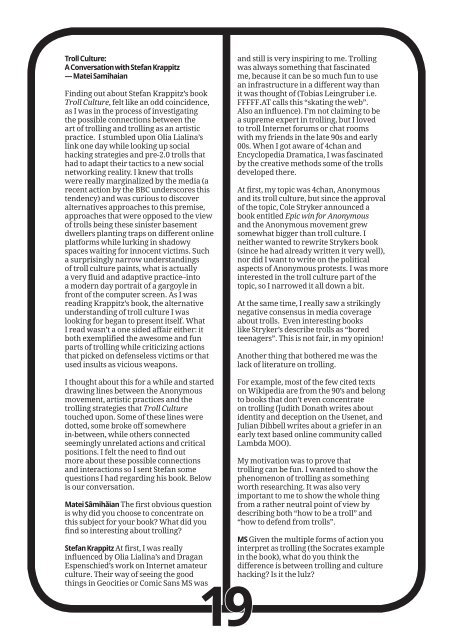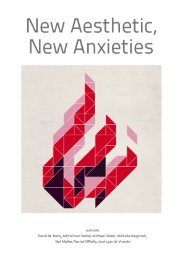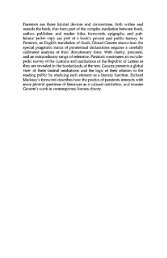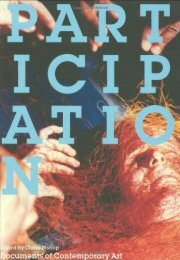Create successful ePaper yourself
Turn your PDF publications into a flip-book with our unique Google optimized e-Paper software.
Troll Culture:A Conversation with Stefan Krappitz— Matei SamihaianFinding out about Stefan Krappitz’s bookTroll Culture, felt like an odd coincidence,as I was in the process of investigatingthe possible connections between theart of trolling and trolling as an artisticpractice. I stumbled upon Olia Lialina’slink one day while looking up socialhacking strategies and pre-2.0 trolls thathad to adapt their tactics to a new socialnetworking reality. I knew that trollswere really marginalized by the media (arecent action by the BBC underscores thistendency) and was curious to discoveralternatives approaches to this premise,approaches that were opposed to the viewof trolls being these sinister basementdwellers planting traps on different onlineplatforms while lurking in shadowyspaces waiting for innocent victims. Sucha surprisingly narrow understandingsof troll culture paints, what is actuallya very fluid and adaptive practice–intoa modern day portrait of a gargoyle infront of the computer screen. As I wasreading Krappitz’s book, the alternativeunderstanding of troll culture I waslooking for began to present itself. WhatI read wasn’t a one sided affair either: itboth exemplified the awesome and funparts of trolling while criticizing actionsthat picked on defenseless victims or thatused insults as vicious weapons.and still is very inspiring to me. Trollingwas always something that fascinatedme, because it can be so much fun to usean infrastructure in a different way thanit was thought of (Tobias Leingruber i.e.FFFFF.AT calls this “skating the web”.Also an influence). I’m not claiming to bea supreme expert in trolling, but I lovedto troll Internet forums or chat roomswith my friends in the late 90s and early00s. When I got aware of 4chan andEncyclopedia Dramatica, I was fascinatedby the creative methods some of the trollsdeveloped there.At first, my topic was 4chan, Anonymousand its troll culture, but since the approvalof the topic, Cole Stryker announced abook entitled Epic win for Anonymousand the Anonymous movement grewsomewhat bigger than troll culture. Ineither wanted to rewrite Strykers book(since he had already written it very well),nor did I want to write on the politicalaspects of Anonymous protests. I was moreinterested in the troll culture part of thetopic, so I narrowed it all down a bit.At the same time, I really saw a strikinglynegative consensus in media coverageabout trolls. Even interesting bookslike Stryker’s describe trolls as “boredteenagers”. This is not fair, in my opinion!Another thing that bothered me was thelack of literature on trolling.I thought about this for a while and starteddrawing lines between the Anonymousmovement, artistic practices and thetrolling strategies that Troll Culturetouched upon. Some of these lines weredotted, some broke off somewherein-between, while others connectedseemingly unrelated actions and criticalpositions. I felt the need to find outmore about these possible connectionsand interactions so I sent Stefan somequestions I had regarding his book. Belowis our conversation.Matei Sâmihăian The first obvious questionis why did you choose to concentrate onthis subject for your book? What did youfind so interesting about trolling?Stefan Krappitz At first, I was reallyinfluenced by Olia Lialina’s and DraganEspenschied’s work on Internet amateurculture. Their way of seeing the goodthings in Geocities or Comic Sans MS was19For example, most of the few cited textson Wikipedia are from the 90’s and belongto books that don’t even concentrateon trolling (Judith Donath writes aboutidentity and deception on the Usenet, andJulian Dibbell writes about a griefer in anearly text based online community calledLambda MOO).My motivation was to prove thattrolling can be fun. I wanted to show thephenomenon of trolling as somethingworth researching. It was also veryimportant to me to show the whole thingfrom a rather neutral point of view bydescribing both “how to be a troll” and“how to defend from trolls”.MS Given the multiple forms of action youinterpret as trolling (the Socrates examplein the book), what do you think thedifference is between trolling and culturehacking? Is it the lulz?








